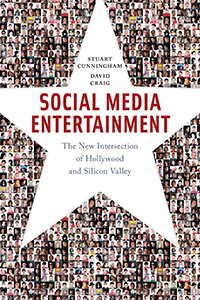—David Craig and Stuart Cunningham
Whether referred to as influencers, YouTubers, vloggers, game players, live streamers, or social media entrepreneurs, creators have become the latest stars in legacy media, if mostly villains. Creators have featured centrally in a wave of films, television, even song lyrics, to demonstrate how they harness platforms for fame, profit, and peril. Start with the “Nosedive” episode of Black Mirror. In the near future, our fates will be algorithmically-determined by favorability ratings across social media platforms. Like a black mirror, our adoption of new technology operates as dystopian reflections of who we are or will soon be. The irony is the series is produced and distributed by Netflix, arguably the most algorithmically-determined platform of all. Netflix has populated an entire category of creator horror stories. In documentaries like American Meme, Follow Me, and Frye creators are profiteering exploiters of the desire for fame and FOMO, the fear of missing out. Their “webcam porn thriller” Cam is rooted in the fear and anxieties of platforms where women who generate income also risk exploitation or far worse.
Off Netflix, one could discover more nuanced accounts of creator culture. Ingrid Goes West begins as a stalker fan film but delivers a more profound critique around the perils of fame and paranoia in the tech age. Comedian and Creator Bo Burnham’s critically-acclaimed Eighth Grade brilliantly navigates the travails of modern-day adolescence, for whom social media and creator culture serves as more symptom than disease. Perhaps the best example is Wu Hao’s award-winning documentary, People’s Republic of Desire, set in the world of competitive Chinese livestreaming. Hao artfully and emotionally captures the precariousness of creative labor online where tech, fame, and fortune intersect. While referred to as a “real-life Black Mirror,” Hao does not settle for a Manichean account. Hao features a devoted fan spending his disposable income to support his favorite streamers which signals to the struggle by lower classes denied social mobility in China’s accelerating digital economy and, more globally, late capitalism.
This wave of legacy media reflects the topic of our book from NYU Press, Social Media Entertainment: The New Intersection of Hollywood and Silicon Valley (SME for short). Featuring over 100 insider interviews, we mapped an alternative cultural industry, driven by creators operating at the leading edge of digital economies. Amongst many distinctions, we found that platforms are not only media channels and creators are not only producers or celebrities. Most notably, creators are social media entrepreneurs, creating value by aggregating and engaging fan communities for profit across many revenue streams.
Creators also create culture and have emerged as drivers of social change with platform-powered means of cultural self-determination. Missing from these legacy media accounts is how creators represent worlds rarely seen before. For over a decade, Asian American creators have over-indexed in SME: there are beauty entrepreneurs like Michelle Phan, storytellers and vloggers Ryan Higa, Wong Fu Productions, and the Fung Brothers, the digital illusions of Zach King, and the star of Evan Tube, the pre-teen millionaire toy unboxer.
Similarly, LGBTQ creators, determining the path of their own queer trajectories from the closet to advocacy, risk more than intimate relationships by coming out online. They risk their livelihood. Arab-speaking Creators, operating from places as remote as Dearborn Michigan, are using these platforms to support their families and promote their brand, while conducting critical social media interventions to posit their own modern, popular, and global Arab and/or Muslim culture. As detailed in our op-ed on Salon, our work has revealed how the most popular and commercially successful creators in SME were often willing to risk their profit and popularity to advocate for progressive causes and politicians in the 2016 elections.
In the wake of techlash, we are “woke” to the perilousness of platforms nurturing hate speech and fake news while selling our privacy. We witness and champion a rising chorus of demands for better platform governance and accountability. But, as we argue here and in the book, SME has become one of the leading edges of global digital economies, alongside what others refer to as maker culture, gig economies, and artisanal economies. Creators are not only craven fame-seeking, selfish selfie-takers for profit. To borrow from Zuckerberg’s now infamous phrase: They don’t just move fast and break things. Creators move fast and make things. Rather, they are remaking the world to better reflect their values, identity, and affinities.


